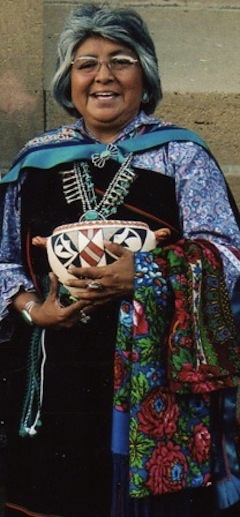New speaker lineup announced for ISU Symposium on Indigenous Languages April 10-12
March 30, 2012
Idaho State University will host the "Symposium on Indigenous Languages: Retention and Revitalization," geared to increase discussion and awareness of the issues concerning indigenous language loss, April 10-12 in the Rendezvous Complex Suites A-C.
 Even though federal legislation exists protecting Native languages and Executive Orders have been issued by Presidents George W. Bush and Barack Obama reiterating that language and culture are to be part of the education provided for American Indian children in the United States, this information is widely unknown or afforded in public schools. Speakers will provide many answers concerning this area of inquiry for those who attend, with opportunities for discussion for participants.
Even though federal legislation exists protecting Native languages and Executive Orders have been issued by Presidents George W. Bush and Barack Obama reiterating that language and culture are to be part of the education provided for American Indian children in the United States, this information is widely unknown or afforded in public schools. Speakers will provide many answers concerning this area of inquiry for those who attend, with opportunities for discussion for participants.
The symposium's original speaker lineup has changed and the schedule below reflects those changes. Reservations for the April 11 luncheon need to be made by April 3 to Rebecca Clover at 282- 2629 or clovrebe@isu.edu before April 3.
• Tuesday, April 10, 9 a.m. – noon and 1:30-4 p.m., speakers include Christine Sims, Pueblo of Acoma, "Importance of Indigenous Languages Revival and Retention"; 7 p.m., film on Wampanoag language efforts followed by discussion.
• Wednesday, April 11, 9 a.m. – noon, speaker Marianna Di Paola, Director of the Center for American Indian Languages at the University of Utah, will be discussing the work being done regarding revitalization of Shoshoni and the need for doing so; noon luncheon, speaker Sky Hopinka, a member of the Hochunk Nation and Pechanga Band of Luiseno Indians, on "Language Loss and Effects on Culture"; 1:30 – 4 p.m., Hopinka will speak on a new methodology being used to teach the Chinuk Wawa language to tribal members; 7 p.m., film on Hawaiian language revitalization efforts followed by discussion.
• Thursday, April 12, 9 a.m. – noon, Michael Fillerup, supervisor, English as a Second Language in Flagstaff, Ariz., schools will discuss Navajo Immersion schools/bilingual education programs and "How to start a successful language preservation program in 10 easy steps" (both the morning and afternoon 2:30-4 p.m. sessions); 1:30 p.m., the children from Candy Titus's language and cultural classes at Lillian Vallely School in Blackfoot/Fort Hall will share their Native culture with audiences followed by reading of a Shoshoni story by Drusilla Gould; 7 p.m., Panel discussion by members of the Shoshone-Bannock Tribes concerning their language retention and revitalization efforts.
Languages around the world are disappearing at a fantastic rate, especially indigenous languages in areas where European nations took control, according to Beverly Klug, ISU education professor and a symposium organizer. The idea that every indigenous person should speak only the language of those who were now in power had its beginnings in the doctrine of "Doctrine of Discovery," which gave power to the Church and European monarchs over the lands and peoples of non-Christian countries in the service of the Christian God.
In the United States this was followed by the concept of "Manifest Destiny," again including this idea that subjugation of Native peoples was the ultimate goal of the government, and that this included eliminating Tribal languages. Educational systems became the tool by which this process was to occur. After it was apparent that this policy proved to be disastrous for Native peoples, plunging them into a world where they were unable to communicate with their own family members and, in general, not accepted as equal to Euro-Americans, the government reversed its course in the late 1920s following an investigation by Lewis Meriam and his team (referred to as the "1928 Meriam Report").
In trying to protect their Native languages, indigenous peoples in the United States found a strong leader in Patricia Ann Locke, Lakota and Chippewa, who grew up on the Ft. Hall Shoshone-Bannock Reservation. Among her decades of working as an educator from elementary to the university levels, she advocated strongly for Native rights in education. She was responsible for pushing for legislation for the preservation of indigenous languages. In 1991, she won a MacArthur Foundation fellowship for her work to save Tribal languages that were on the brink of extinction. Locke passed away in 2001.
The symposium is supported in part by a grant from the Idaho Humanities Council, a state-based program of the National Endowment for the Humanities. Visit www.idahohumanities.org for more information on the Idaho Humanities Council.
Other sponsors include the ISU College of Education, ISU College of Arts and Letters, Department of Anthropology, the ISU Office of Research, and the ISU Cultural Affairs Council.
Additional members of the symposium committee are Christopher Loether, ISU anthropology professor; Drusilla Gould, Shoshone-Bannock Tribal Member and senior lecturer, ISU Department of Anthropology; and Sherice Gould, Language and Cultural Preservation Department Manager, Shoshone-Bannock Tribes.
###
Categories:
